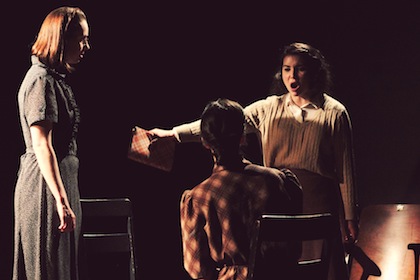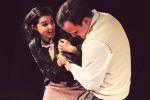Morgan Hayley Smith as Anne and Gabriele Metcalfe as Peter in Fighting Chance Productions’ The Diary of Anne Frank. (photo from FCP)
“In spite of everything, I still believe that people are really good at heart.” This iconic quote from Anne Frank’s diary is known the world over. Can you imagine having this outlook after hiding from the Gestapo for two years in an Amsterdam building annex with seven other people, never being able to go outside and living in constant fear of discovery? These words exemplify Anne’s character – innocent yet resilient, courageous and optimistic. But she also personifies the tragedy of the Nazi genocide of six million European Jews – their only crime: being Jews.
Anne’s legacy is her diary, vignettes of daily wartime life in hiding, as seen through the eyes of a 13-year-old girl. The diary has sold more than 30 million copies and been translated into 60 languages. In 1955, husband-and-wife writing team Frances Goodrich and Albert Hackett adapted it for the Broadway stage. The result was a Pulitzer Prize for drama and a Tony for best production. However, the script omitted most references to Judaism (to make the show more “universal”) as well as any thoughts Anne had about sex, the latter at the request of her father, Otto, the sole survivor of the annex. Now, a local theatre company, Fighting Chance Productions (FCP), is staging the 1997 Wendy Kessleman adaptation that puts the Judaism and Anne’s budding sexuality back into the script to present a more authentic portrait of what happened in that annex at 263 Prinsengracht.
FCP presents the piece in the round at the intimate 50-seat Havana Theatre on Commercial Drive on a minimalist set – eight chairs on the bare floor. The first row of seats is also on the floor, so most of the audience is on the same level as the actors, or only a step up, making us part of the narrative.
Anne (Morgan Hayley Smith) and her family – father Otto (Cale Walde), mother Edith (Gina Leon) and sister Margot (Diana Beairsto) – are hidden in a secret annex behind a bookcase in Otto’s office building. Their protectors are friends and neighbours Mr. Kraler (Drew Hart) and Miep (Tori Fritz), who are the provisioners and news-bearers during the family’s sojourn in hiding and their only contact with the outside world. The Franks are soon joined by the van Daan family – father (Bruce Hill), mother (Leanne Kuzminski), 16-year-old Peter (Gabriele Metcalfe) and Mouschi, Peter’s black cat. Months later, they are asked to take in neurotic dentist Mr. Dussel (Thomas King). Within the confines of the annex, these very different people have to learn to live and let live as they try to bring a sense of normalcy into their daily routines. And they manage to do so – until Aug. 4, 1944, when they are betrayed and taken to concentration camps.
On opening night at the Havana, you could have heard a pin drop as the audience experienced this compelling story in the small theatre, which was both cozy and claustrophobic. Some audience members could have reached out and touched the actors as they moved about the shadowy set.

All of the acting is strong in this production, but Smith is the stand out, seemingly born to play the role of Anne. She is lovely and has the right mix of emotions as she faces the usual teenage girl issues – first kiss, mother problems, sister rivalry. She is coy when she has to be, outspoken on all subjects and feisty when verbally sparring with her fellow annex occupants (Hill, Kuzminski and King are stellar in these moments). Metcalfe presents a believable, shy and awkward Peter, just learning how to navigate his way around girls, and he and Smith have real chemistry on stage – what a tender moment when they first brush lips. Walde is strong as the reliable father figure while Leon and Beairsto lend quiet dignity to their roles. During intermission, the cast stays in character and on set, a reminder that, while we, the audience, have the freedom to move about, Anne and the others cannot escape their prison – a brilliant directorial artistic choice.
There is a last poignant moment just before the group is captured. Peter says that, when he gets out, he is going to make sure that no one knows that he is Jewish, as life would be a lot easier as a Christian. Anne quickly responds, “I’d never turn away from who I am. I couldn’t. Don’t you know, you’ll always be Jewish … in your soul.”
This production, in its simplicity, succeeds on so many levels – the set, the sound design, the muted tones of the costumes, the lighting and, notably, those all-important moments of silence, which often have more impact than the dialogue itself. The Diary of Anne Frank is a rich, powerful drama.
A great responsibility comes with staging this type of play. Kudos to this company and co-directors Ryan Mooney and Allyson Fournier, who have met the challenge – it is essential for Anne’s story to continue to be told.
The show runs until June 23 at the Havana. For tickets and more information, visit fightingchanceproductions.com.
* * *
The JI interviewed Smith (MHS) and Mooney (RM) by email during the rehearsal period.
JI: What made you want to do this show?
RM: I have always been a fan of the Anne Frank story. I remember being drawn to her book when I was in elementary school and seeing the classic movie in high school. I have seen several productions in the past and always wanted an opportunity to direct it myself. The story is timeless and hopeful and I like playing with the dark and light of humanity.
MHS: I played Anne in a drama festival production in junior high. I felt a connection because of this and also because I dreamed of being a writer when I was a teenager. The story moved me even back then and I have always been amazed at how this young girl viewed what was happening in her country.
JI: What was the audition process like?
RM: It was trickier than usual for this show. We saw a lot of people but wanted to take the time and care to ensure we had a perfect cast. I am very happy with how we ended up.
JI: How did you feel about getting the role of Anne?
MHS: I felt surprised and very lucky to be selected, as I actually went in to audition for Margot, her sister. I am an older sister myself and felt I could relate to Margot. It was a nice surprise to be asked instead to call up my bright-eyed inner child and set aside the responsible sister side. It was even better to find that inner child still there as lively as ever.
JI: Has the play impacted your life in any way?
RM: I think seeing how the cast has really come to the table for this one has been touching to me. The way the cast has been affected by the characters has surprised me. It should not though, because they are compassionate and empathetic actors and people.
MHS: I definitely feel an impact. I find myself so thankful that I have the smallest freedoms, like going outside and walking in the fresh air, and that I have been able to grow up and get answers to questions about myself, questions that Anne never got to answer. What might surprise people about this show – and Anne’s diary itself – is how joyful and full of life it is. I have been feeling inspired to take in beauty from the day-to-day and really appreciate things that are taken for granted.
JI: Is the play appropriate for all audiences?
MHS: I highly encourage audiences of all ages to see this play. I think it is very easy to lose a degree of connection when a story is as widely known as this one is. This play shows these characters and their circumstances not as grand ideas, but as everyday people, people with clashing personalities, people who have vices, prized possessions, teenage crushes and lingering questions. Despite the tragedy, at its core it’s a story about people and about the universal experience of growing up.
JI: What would you like audiences to take away from this production?
RM: I hope they walk away with a remembrance of this tragic time and its focus on the individual. It is easy to get overwhelmed with the six million-plus deaths during the Holocaust but it is appropriate to sit and see the effect on one individual, the humanizing factor.
MHS: Above anything else, I hope audiences take away from this play what I did: a renewed human connection for the people these events touched, and an appreciation for the privilege it is to be able to grow up.
Tova Kornfeld is a Vancouver freelance writer and lawyer.
* * *
• Last month, researchers using digital technology uncovered two new pages of Anne Frank’s diary, which contained “naughty jokes” and discussions about sex and prostitution.
• A biography about Dutch resistance activist Elisabeth “Bep” Voskuijl, who was of one of Otto Frank’s employees, suggests the possibility that it was Voskuijl’s sister who outed the annex residents to the Nazis.
– TK

